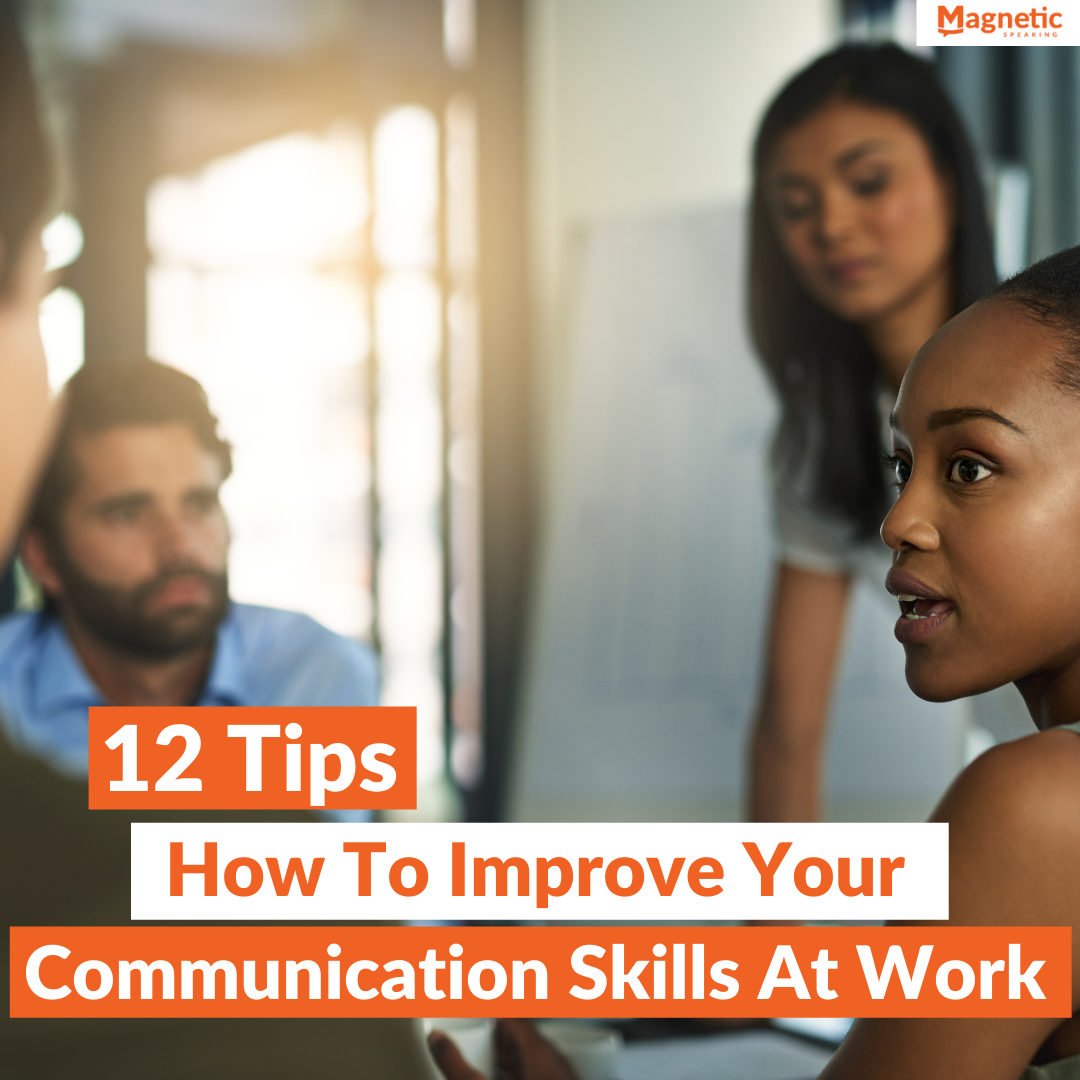Many people view job interviews as a 1-way flow of information: question → answer, question → answer. A great interview should feel more natural, like a conversation. One way to do achieve this is by asking questions yourself! This will help you seem more comfortable, confident and overall stand out as a candidate.
You can prepare questions by looking online for sample questions to help you prep – but what’s more important is to understand the thought process behind these questions so that you can construct your own (and find out the information that’s important to you!).
This article will walk you through key categories of questions, the thought process of each category as well as some examples.
Mindset
Okay – now you know that you have to ask questions in an interview. But you can’t randomly fire off questions for the sake of asking questions. It’ll come across as trying to fill the space.
Instead, get clear on your mindset first. What’s your internal attitude when asking these questions? Do you want to know more about the team? About their values? How the interviewer like the company?
Notice these questions are more open-ended. They create opportunities for a deeper conversation. And that’s because they come from a mindset of curiosity – you’re genuinely interested in what you’re applying for. If you’re having a hard time being curious, work on creating this mindset for yourself. Get yourself excited about what’s ahead of you. If it’s still difficult, you may have to think about whether you really care about this position!
Now, assuming you’re curious, there are 3 large categories of valuable questions: Connecting, Directionalizing, and Evaluating Questions.
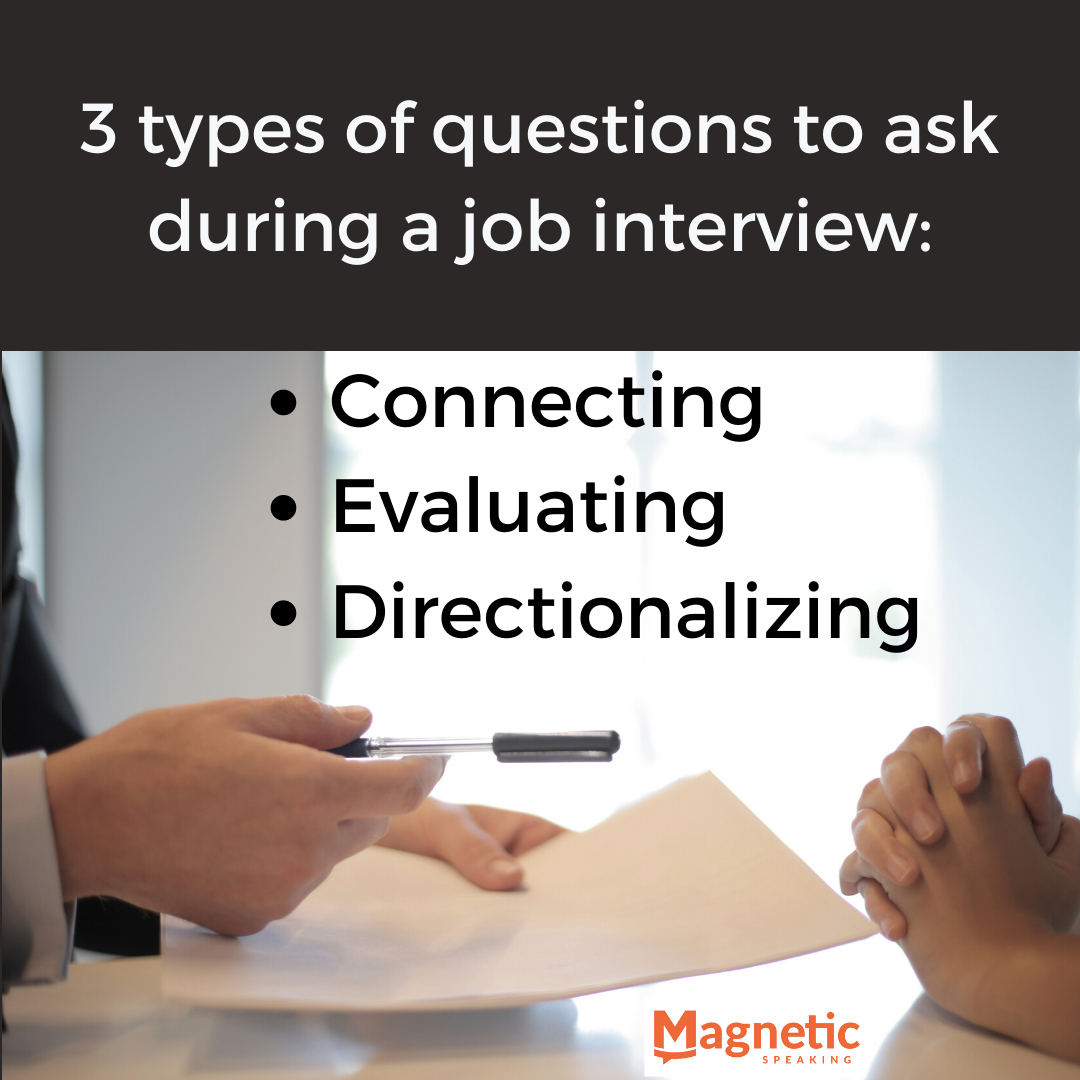
Connecting Questions
When you’re in interview mode, you’re considering a lot at once – what kind of opportunities the role provides, how well qualified you are, how you’re going to fit in with the team, what’s the pay structure, etc.
Something that often gets overlooked is whether you’re connecting on a personal level with the interviewer. When a hiring manager is debating between two highly qualified candidates, you can bet they’re going to bias towards the person they formed a better connection with. These are the types of decisions that happen behind closed doors and even unconsciously.
And it’s not just important with the hiring manager or the team. It’s important even at the recruiter level. One of our team members here at Magnetic was a recruiter, and he said he’d always be willing to advocate for the candidate that he formed a personal connection with.
So right off the bat, connect with the recruiter and the hiring manager on a personal level and continue that throughout the interview. You can ask about things like hobbies, what they do for fun, where they live, or how their day’s been going.
Pro tip: Rather than asking questions, you can also bring up personal examples throughout your interview to see if your interviewer relates!
The bottom line is that even if the interviewers aren’t conscious about it, they hire people that they like and have something in common with. (P.S. Smiling goes a long way!)
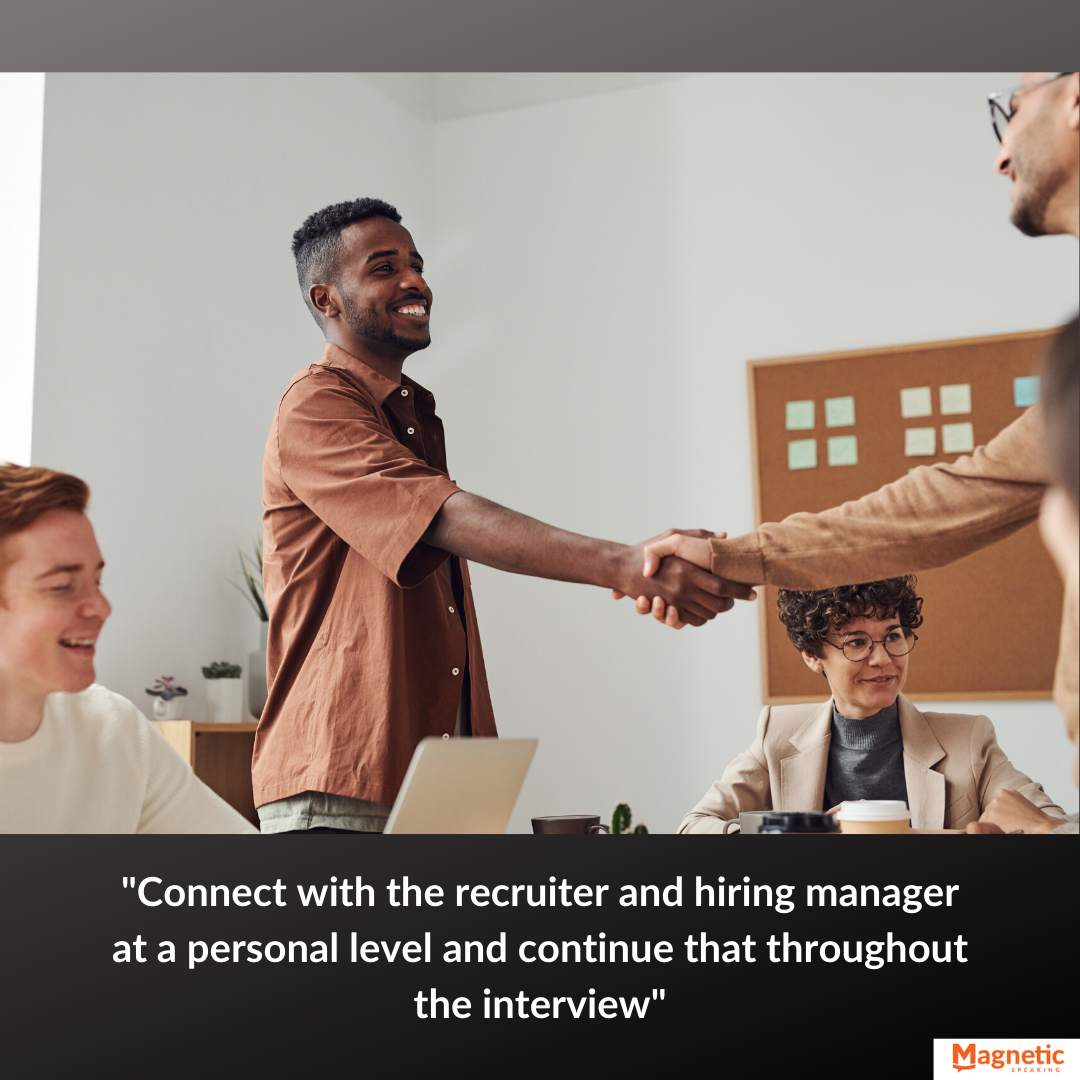
Directionalizing Questions
In addition to using questions to connect with the interviewers, asking questions can give you a chance to directionalize the interview – meaning take the interview to a place where you have an advantage.
For example, let’s say you have lots of experience in starting manufacturing facilities but the interviewer hasn’t asked you anything in that area to allow you to showcase your expertise. That’s a problem because a significant part of your knowledge is not getting the light it deserves. What do you do?
One way to take the discussion there is to ask the interviewer about their manufacturing facility. Ask about progress, timelines, new initiatives, challenges, etc. After they answer you, you’ll get to share your insights on the subject.
Notice, you took the interview in a direction you wanted to go simply by asking the right question.
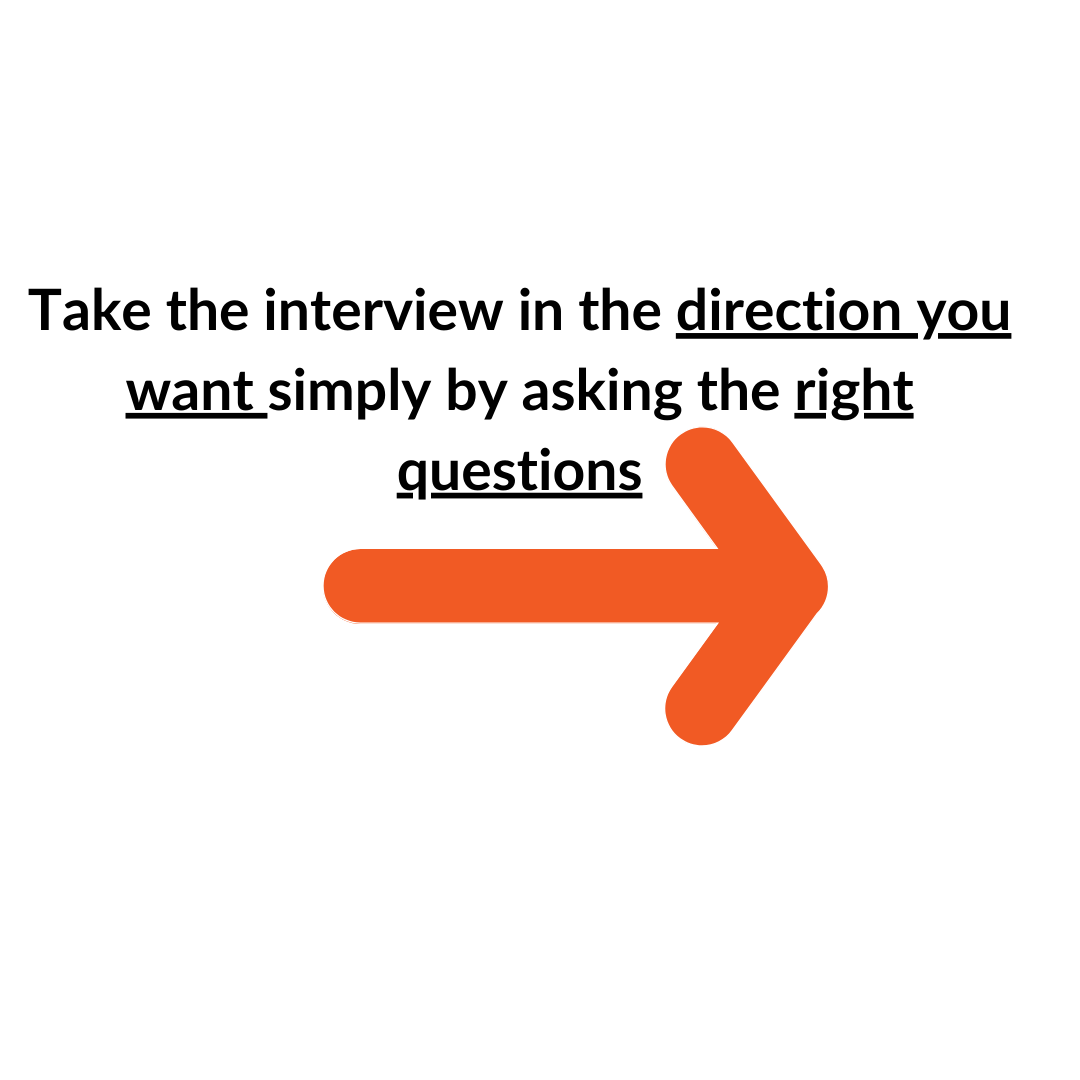
Evaluating Questions
It’s important to remember that in an interview, you’re interviewing them as much as they’re interviewing you. At the end of the process, if it goes well, they’ll extend you the offer to accept or decline.
Before the interview, It helps to identify your values. What do you care about in a job? Personal development? Autonomy? Flexibility? Collaboration? By knowing these things ahead of time, you’ll be able to ask the right questions to truly evaluate the opportunity.
Near the end of the interview, when they typically open it up to questions, you’ll want to have some prepared beforehand (even if they’ve answered all your questions, think quick on your feet to ask some more). Not only does it show you’re curious, engaged, and thoughtful but helps you determine if the job, team, and company are a good fit.
This is a golden opportunity for you to really feel if there’s the alignment you’re looking for.
Bonus: What About Sensitive Questions?
Sensitive topics are bound to come up in the interview process. It could be you’re asked something like why you left your previous role, or maybe you want to ask a question around something like a PR issue the company had, or your potential salary. Ultimately, it’s important to be open and honest in these conversations and also, be mindful in the process.
With salary, for example, your mindset should be to find a WIN/WIN. Of course you need to be making enough money to live on, and it’s ok to negotiate (recommended in fact, here are some tips) but you also don’t want to rub the interviewer the wrong way by pressing too hard for more money. If it’s between you and another candidate, and you pressed too hard in the interview for more money, that could set the relationship off to a bad start, or worse, they decide to choose the other candidate.
To satisfy your curiosities, see what you can find out before the interview. You can find out a lot of information by asking the recruiter or hiring manager. You can also use external recourse like Glassdoor.
Conclusion
The interview process should be a discussion – questions and answers flow back and forth to gain clarity and understanding from both sides. Imagine a ping pong game: the ball never spends more time on one side of the table.
If the interviewer asks most of the questions, then the interview will feel like an interrogation. If you ask most of the questions, then the interviewer won’t get to know you. The discussion should be balanced.
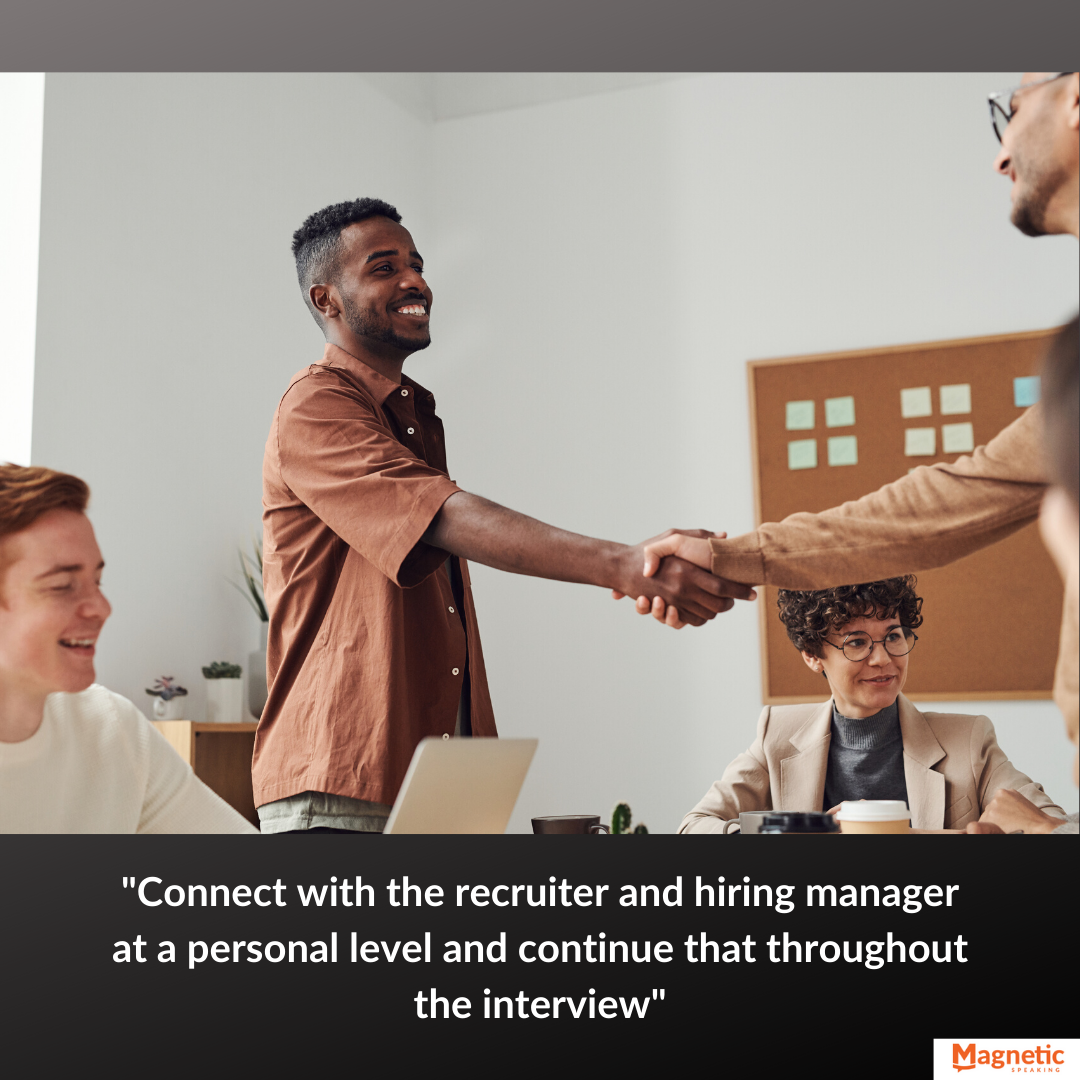
It’s best if you ask questions during and at the end of the interview. Even though it’s a good idea to look at generic questions you can look up on the internet – it’s more important to understand the mindset and intention behind these questions so that you come away from the interview with all the information you need to make an informed decision about the opportunity!
Good luck on your next interview and if you want to learn more about 1:1 interview coaching, contact us – we’d love to help!


